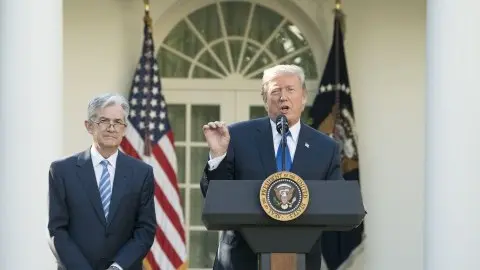Trump needs to take a step back to win his trade war
President Trump needs a trade deal with China in order to claim he is delivering on his promise to improve the terms of trade for the US. For a deal to be struck, however, he needs to scale back his overambitious list of demands
Another disappointment
Market optimism increased after Presidents Trump and Xi decided last month to resume negotiations. Since then, China's official news agency Xinhua has said some Chinese companies are seeking new purchases of US agricultural products. This is a step in the right direction, but not more than a very small step. Markets could be in for another disappointment because, as of yet, there are no other concrete signs that negotiators are getting closer to a deal. On the contrary, China has demanded that the US lift all tariff hikes before a deal can be cut, which doesn't align well with the American approach to keep the pressure on even after a deal, to enforce Chinese compliance. US weapons sales to Taiwan and the subsequent Chinese threat to put all American companies involved on a black list, have also not helped to create a positive negotiating climate.
Trump never misses a chance to say that China needs a deal much more than the US. And looking at trade alone, he's right. After all, American demand for Chinese products contributes more than four times as much to Chinese GDP than the contribution of Chinese demand to US GDP. This explains why China was willing to make concessions during the first round of negotiations in the spring of 2018. In those talks, led by Treasury Secretary Steven Mnuchin, China offered to raise its imports of US products by $70 billion, an increase of more than 50%. China also offered to open up its financial, automotive and energy markets.
Mnuchin thought he had put together a pretty good deal, but long term China hawks Robert Lighthizer and Peter Navarro dismissed it as insufficient and convinced the President to scrap it.
US trade representative Lighthizer and trade advisor Navarro are known for their decade-long fierce criticism of China’s economic policy and they see Trump's presidency as a golden opportunity to address their issues. As a result of their influence, the US is demanding, not just lower Chinese import barriers to get the trade deficit down and fewer restrictions for foreigners to invest in China, but a much broader wish list, which includes China giving up its ambition to become a market leader in various high tech markets in 2025. For China, this is unacceptable interference with its right to determine its own economic policy.
Overplaying his hand
By continually hiking tariffs on Chinese imports, Trump has been trying to push China into accepting these far reaching demands.
Aiming high and piling on the pressure has always been Trump's favourite strategy. But this time it could get him into trouble. He has had little success with this tactic for over a year now. In the final phase of the unsuccessful negotiations last spring, China took on a tougher stance and there are no signs yet that this has changed. Giving up sovereignty is simply not a price that China is prepared to pay for the sake of frictionless trade with the US.
To avoid overplaying his hand, Trump will have to scale down his demands. Free trade with the US is worth a lot to China, but demanding that China give up its ambition to conquer tech markets is pushing it too far. The US blacklisting of tech company Huawei has been seen by China as part of America's plan to stop the economic progress of Chinese tech companies.
A less confrontational approach by the President would help as well. Trump's communication style is not always perceived by the Chinese as respectful, which increases the domestic pressure on Chinese leaders to be tough as well.
Treating the Chinese as an equal partner creates a more positive negotiating climate in which other differences- for example regarding the enforcement mechanism of a trade deal- could be resolved more easily.
Another round of tariffs
For now, there are no signs that the US administration is prepared to water down its demands and change its negotiation style. Given the much tougher public stance of the Chinese authorities, further concessions would be a face losing event for Chinese leaders which also makes it unlikely that a deal will be cut anytime soon.
As a result, the two sides seem to be too far apart and the negotiating climate has deteriorated too much for a deal to be struck anytime soon. This makes it likely that a new round of negotiations will be unsuccessful as well. Chances are that the President will then follow through on his threat to extend the tariff hike to all imported goods from China. In which case, China will retaliate.
A deal after all
In the end, however, both sides have a strong incentive to strike a deal. Hoping for a more pro free trade democratic US president in 2021, China could, as President Trump suggested last week, decide to wait until after the US elections before it is willing to compromise. But a further deterioration in the tit-for-tat trade war will lead to significant economic damage for China because of its dependency on US demand.
Yet Trump also needs a deal. China is responsible for half of the overall American deficit in traded goods and Trump has vowed to take action. If he fails to get a result, he will only be able to point to the renewal of the Nafta trade agreement and a few smaller deals with countries on their exports of steel and aluminium to the US. That won’t be enough for the president to claim he has successfully reduced the trade deficit.
As such, the US administration has a strong incentive to drop some of its most far reaching demands, which in turn would allow China to make concessions of its own. If an agreement is to be reached in the near future, Trump will need to back down.
Tags
Trade warsDownload
Download article
2 August 2019
In case you missed it: When trade, markets and the Fed collide This bundle contains 8 articles"THINK Outside" is a collection of specially commissioned content from third-party sources, such as economic think-tanks and academic institutions, that ING deems reliable and from non-research departments within ING. ING Bank N.V. ("ING") uses these sources to expand the range of opinions you can find on the THINK website. Some of these sources are not the property of or managed by ING, and therefore ING cannot always guarantee the correctness, completeness, actuality and quality of such sources, nor the availability at any given time of the data and information provided, and ING cannot accept any liability in this respect, insofar as this is permissible pursuant to the applicable laws and regulations.
This publication does not necessarily reflect the ING house view. This publication has been prepared solely for information purposes without regard to any particular user's investment objectives, financial situation, or means. The information in the publication is not an investment recommendation and it is not investment, legal or tax advice or an offer or solicitation to purchase or sell any financial instrument. Reasonable care has been taken to ensure that this publication is not untrue or misleading when published, but ING does not represent that it is accurate or complete. ING does not accept any liability for any direct, indirect or consequential loss arising from any use of this publication. Unless otherwise stated, any views, forecasts, or estimates are solely those of the author(s), as of the date of the publication and are subject to change without notice.
The distribution of this publication may be restricted by law or regulation in different jurisdictions and persons into whose possession this publication comes should inform themselves about, and observe, such restrictions.
Copyright and database rights protection exists in this report and it may not be reproduced, distributed or published by any person for any purpose without the prior express consent of ING. All rights are reserved.
ING Bank N.V. is authorised by the Dutch Central Bank and supervised by the European Central Bank (ECB), the Dutch Central Bank (DNB) and the Dutch Authority for the Financial Markets (AFM). ING Bank N.V. is incorporated in the Netherlands (Trade Register no. 33031431 Amsterdam).
